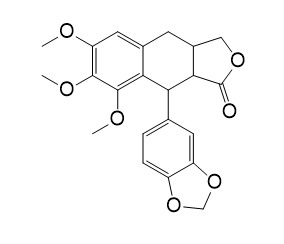Marginatoxin
Marginatoxin may be a promising chemopreventive agent for treating hepatocellular carcinoma, it induces human hepatoma BEL-7402 cells apoptosis in vitro and in vivo via activation of Fas/FasL-mediated apoptotic pathway.
Inquire / Order:
manager@chemfaces.com
Technical Inquiries:
service@chemfaces.com
Tel:
+86-27-84237783
Fax:
+86-27-84254680
Address:
1 Building, No. 83, CheCheng Rd., Wuhan Economic and Technological Development Zone, Wuhan, Hubei 430056, PRC
Providing storage is as stated on the product vial and the vial is kept tightly sealed, the product can be stored for up to
24 months(2-8C).
Wherever possible, you should prepare and use solutions on the same day. However, if you need to make up stock solutions in advance, we recommend that you store the solution as aliquots in tightly sealed vials at -20C. Generally, these will be useable for up to two weeks. Before use, and prior to opening the vial we recommend that you allow your product to equilibrate to room temperature for at least 1 hour.
Need more advice on solubility, usage and handling? Please email to: service@chemfaces.com
The packaging of the product may have turned upside down during transportation, resulting in the natural compounds adhering to the neck or cap of the vial. take the vial out of its packaging and gently shake to let the compounds fall to the bottom of the vial. for liquid products, centrifuge at 200-500 RPM to gather the liquid at the bottom of the vial. try to avoid loss or contamination during handling.
Appl. Sci.2020, 10(20), 7323.
Turk J Med Sci.2023 53: 1312-1320.
Nat Commun.2023 Dec 20;14(1):8457.
Pharmaceuticals (Basel).2024, 17(10):1368.
Front Nutr.2023, 10:1181135.
Sains Malaysiana2022, 51(4):1143-1154
Molecules2022, 27(9):2992.
Horticulturae2024, 10(5), 486.
Food Res Int.2020, 128:108778
J Agric Food Chem.2020, 68(43):12164-12172.
Related and Featured Products
Phytochemistry Letters, 2012, 5(2):387-392.
A novel cytotoxic aryltetraline lactone from Bupleurum marginatum (Apiaceae)[Reference:
WebLink]
METHODS AND RESULTS:
A detailed phytochemical study of the aerial parts of Bupleurum marginatum Wall. ex DC revealed a novel aryltetraline lactone lignan identified as 9-(benzo[d][1,3]dioxol-5-yl)-6,7,8-trimethoxy-3a,4,9,9a-tetrahydronaphtho[2,3-c]furan-1(3H)-one (Marginatoxin) along with nine known compounds and characterization of five other compounds either by GLC/MS or LC/MS techniques. Chemical structures of the isolated compounds were unambiguously elucidated by both 1D, 2D NMR and mass spectrometry techniques.The in vitro cytotoxic activity of both methanol and dichloromethane extracts as well as the isolated compounds was assessed in two human cancer cell lines HepG2 and HeLa using the MTT assay.
CONCLUSIONS:
The new aryltetraline lactone lignan exhibited a potent cytotoxic activity with IC50 values of 12.14 and 16.90 μM after 24 h treatment for HepG2 and HeLa cells, respectively.
Biomedical Research,2017,28(3).
Marginatoxin induces human hepatoma BEL-7402 cells apoptosis in vitro and in vivo via activation of Fas/FasL-mediated apoptotic pathway.[Reference:
WebLink]
Marginatoxin, an aryltetraline lactone lignan isolated from Bupleurum marginatum Wall. ex DC (Apiaceae), showed cytotoxic activity against human hepatocellular carcinoma. However, the cytotoxic mechanisms of Marginatoxin against cancer cells remained unclear.
METHODS AND RESULTS:
This study was designed to investigate the detailed mechanism of its cytotoxic effect on human hepatoma BEL-7402 cells by CCK-8, flow cytometry, western blot and xenograft assays. Marginatoxin caused a dose-dependent growth inhibition of BEL-7402 cells with an IC50 of 15.20 μg/ml. Marginatoxin induced BEL-7402 cells apoptosis identified by annexing V/propidium iodide staining kits with the aid of flow cytometry. Marginatoxin-induced apoptosis was characterized by increasing Fas, FasL and Fas associated protein with death domain expression, and cleavage of caspase-8, caspase-10, caspase-3. Furthermore, the results of xenograft assay suggested that Marginatoxin inhibited the BEL-7402 cells-induced tumor growth without effect on body weight of nude mice in vivo by regulating the expression levels of above apoptotic proteins. These results demonstrated that Marginatoxin could induce apoptosis of human hepatoma BEL-7402 cells in vitro and in vivo through activation of Fas/FasL-mediated apoptotic pathway.
CONCLUSIONS:
All these findings demonstrated that Marginatoxin may be a promising chemopreventive agent for treating hepatocellular carcinoma. Moreover, there is a need to further investigate Marginatoxin in this regard.



